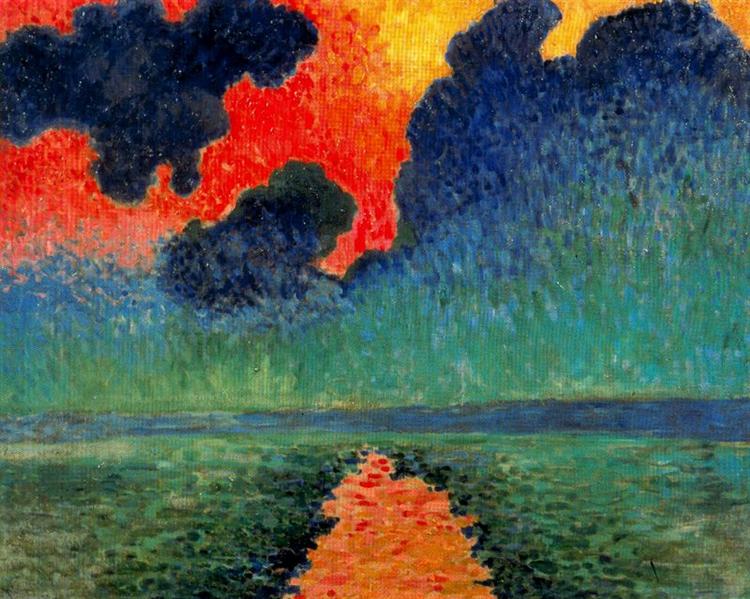FINIS (3)
By:
July 28, 2021

HiLoBooks is pleased to serialize Canadian author Frank L. Pollock’s 1906 proto-sf story “Finis” (also published as: “The Last Dawn”) for HILOBROW’s readers.
ALL INSTALLMENTS: 1 | 2 | 3 | 4 | 5.
The brilliant moon faded to a feathery white film in the glare. There was a confused outcry from the observatory overhead, and a crash of something being broken, and as the strange new sunlight fell through the window the onlookers leaped back as if a blast furnace had been opened before them.
The glass cracked and fell inward. Something like the sun, but magnified fifty times in size and hotness, was rising out of the sea. An iron instrument-table by the window began to smoke with an acrid smell of varnish.
“What the devil is this, Eastwood?” shouted Davis accusingly.
From the streets rose a sudden, enormous wail of fright and pain, the outcry of a million throats at once, and the roar of a stampede followed. The pavements were choked with struggling, panic-stricken people in the fierce glare, and above the din arose the clanging rush of fire engines and trucks.
Smoke began to rise from several points below Central Park, and two or three church chimes pealed crazily.
The observers from overhead came running down the stairs with a thunderous trampling, for the elevator man had deserted his post.
“Here, we’ve got to get out of this,” shouted Davis, seizing his wife by the arm and hustling her toward the door. This place’ll be on fire directly.”
“Hold on. You can’t go down into that crush on the street,” Eastwood cried, trying to prevent him.
But Davis broke away and raced down the stairs, half carrying his terrified wife. Eastwood got his back against the door in time to prevent Alice from following them.
“There’s nothing in this building that will burn, Miss Wardour,” he said as calmly as he could. “We had better stay here for the present. It would be sure death to get involved in that stampede below. Just listen to it.”
The crowds on the street seemed to sway to and fro in contending waves, and the cries, curses, and screams came up in a savage chorus.
The heat was already almost blistering to the skin, though they carefully avoided the direct rays, and instruments of glass in the laboratory cracked loudly one by one.
A vast cloud of dark smoke began to rise from the harbour, where the shipping must have caught fire, and something exploded with a terrific report. A few minutes later half a dozen fires broke out in the lower part of the city, rolling up volumes of smoke that faded to a thin mist in the dazzling light.
The great new sun was now fully above the horizon, and the whole east seemed ablaze. The stampede in the streets had quieted all at once, for the survivors had taken refuge in the nearest houses, and the pavements were black with motionless forms of men and women.
“I’ll do whatever you say,” said Alice, who was deadly pale, but remarkably collected. Even at that moment Eastwood was struck by the splendour of her ethereally brilliant hair that burned like pale flame above her pallid face. “But we can’t stay here, can we?”
“No,” replied Eastwood, trying to collect his faculties in the face of this catastrophic revolution of nature. “We’d better go to the basement, I think.”
In the basement were deep vaults used for the storage of delicate instruments, and these would afford shelter for a time at least. It occurred to him as he spoke that perhaps temporary safety was the best that any living thing on earth could hope for.
But he led the way down the well staircase. They had gone down six or seven flights when a gloom seemed to grow upon the air, with a welcome relief.
It seemed almost cool, and the sky had clouded heavily, with the appearance of polished and heated silver.
A deep but distant roaring arose and grew from the south-east, and they stopped on the second landing to look from the window.
A vast black mass seemed to fill the space between sea and sky, and it was sweeping towards the city, probably from the harbour, Eastwood thought, at a speed that made it visibly grow as they watched it.
“A cyclone — and a waterspout!” muttered Eastwood, appalled.
He might have foreseen it from the sudden, excessive evaporation and the heating of the air. The gigantic black pillar drove towards them swaying and reeling, and a gale came with it, and a wall of impenetrable mist behind.
As Eastwood watched its progress he saw its cloudy bulk illumined momentarily by a dozen lightning-like flashes, and a moment later, above its roar, came the tremendous detonations of heavy cannon. The forts and the warships were firing shells to break the waterspout, but the shots seemed to produce no effect. It was the city’s last and useless attempt at resistance. A moment later forts and ships alike must have been engulfed.
RADIUM AGE PROTO-SF: “Radium Age” is Josh Glenn’s name for the nascent sf genre’s c. 1900–1935 era, a period which saw the discovery of radioactivity, i.e., the revelation that matter itself is constantly in movement — a fitting metaphor for the first decades of the 20th century, during which old scientific, religious, political, and social certainties were shattered. More info here.
SERIALIZED BY HILOBOOKS: James Parker’s Cocky the Fox | Annalee Newitz’s “The Great Oxygen Race” | Matthew Battles’s “Imago” | & many more original and reissued novels and stories.
